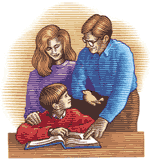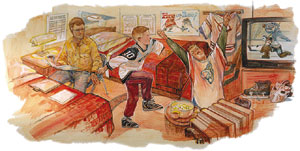![]() January-February 2001
January-February 2001

By Robert W. Peterson
Illustration by Joel Snyder

Every sports fan is well aware that many superstar athletes leave something to be desired as sportsmen (and women). They talk trash, taunt opponents, and celebrate touchdowns or baskets with dances or gestures designed to show up the other side. A few stars also use illegal drugs, drink too much, and are sometimes accused of assaulting their spouses, friends, or casual acquaintances.
Still, their athletic skills are admirable, and many children want to emulate them. So what's a parent to do if a child adopts as his hero a sports figure whose behavior, either in or out of the arena, is undesirable?
The parent can start by putting the question into perspective, something he or she is uniquely qualified to do.
"Parents are stronger role models for their children than athletes," said Temple University psychologist Frank Farley, Ph.D. "In fact, in the kind of empirical research I do, I find that mothers and fathers are at the top of the list as heroes for their children," said Farley, who was president of the American Psychological Association in 1993-94.
That's not just for young children either. "When I ask people in their 20s about their heroes, I get about the same percentage who say their parents are," Farley said.
He is not alone in his findings. Researchers who queried Canadian teenagers about their role models also found parents leading the list. "That's very encouraging," Farley said. "There's nobody that beats parents, nobody."
But how can parents explain to a child that superlative athletes may have feet of clay in their personal lives?
For one thing, the parent can make it clear that the ability to make a jump shot or hit a home run does not make the athlete a good person. By the time a child is 6 or 7 years old, he or she can make that distinction, and it's up to the parent to draw it.
"I always say, be honest," Farley advised. "Some superstar sports figures are fallen idols." So, he said, the parent should point out that people may be fantastically talented in one thing and bad in something else.
Sports stars can be important role models, so "it's important for parents to deal with an athlete's failings," Farley declared. "The parents might point out that the star may be under enormous pressure to achieve" and that may cause him to behave boorishly.
"Try to focus on the good things about the sports hero," Farley suggested. He noted that it's hard, if not impossible, to find a role model who is perfect in every way, but there are certainly some positive ones. One example he gave was Michael Jordan. "He is one of the greatest—if not the greatest—basketball player who ever lived, and he was never guilty of boorish behavior."
Some stars decline the designation of role model. Basketball star Charles Barkley, for example, made a famous commercial for Nike shoes a few years ago in which he said, "Just because I can dunk a basketball doesn't mean I should raise your kids." True, but Barkley was a role model for basketball-loving kids, whether he liked it or not.
The late Mickey Mantle of the New York Yankees, who would make the top 25 all-time greats on anyone's list, had this to say about himself as a role model: "Play like me; don't be like me."
Mantle had an alcohol problem and, like many ballplayers, was gone from home so much that he did not see enough of his four sons. But in addition to his tremendous ability on the field, Mickey Mantle personified courage and could be a role model for anyone in that respect.
Toward the end of the 1961 season, Mantle was hospitalized with a badly infected hip. Despite great pain, he insisted on playing in the World Series against the Cincinnati Reds even though blood was seeping through his uniform pants. He later wrote a book called The Quality of Courage in which he celebrated that virtue in athletes and others, including his father.
Should parents encourage their children to look close to home for role models—a local high school athlete, a coach, a Scoutmaster? "Absolutely!" Farley said. "The child can relate more easily to them. It isn't that easy to relate to a multimillionaire superstar." S
Robert W. Peterson is a Scouting magazine contributing editor.
Doing Good While Doing Very WellThere is a widespread perception that many sports heroes are self-centered multimillionaires with me-first attitudes. Without a doubt, some are, but not all of them. Take, for instance, Dikembe Mutombo, the 7-foot-2-inch pivotman of the Atlanta Hawks basketball team. He is nearing the end of a five-year, $56 million contract for blocking shots, clogging the middle, and regularly earning the NBA's Defensive Player of the Year award. In his free time, Mutombo runs his namesake foundation which aims to improve health conditions in his home country, the Democratic Republic of Congo, in central Africa. One in five Congolese children die before the age of 5 because of poverty and the dearth of medical care. One of Motumbo's goals is to build a $44 million hospital in Kinshasa, the capital and his hometown. He has given several million dollars to that cause and frequently speaks before business and charitable groups to solicit support. Giving time and money to help kidsThen there's Andre Agassi, the professional tennis superstar who used to be noted for his bad-boy image on the court, hurling rackets and spitting at umpires. Today he is more noted for his philanthropy, having donated $1.28 million to build a new Boys & Girls Club in his hometown, Las Vegas, and setting up a foundation that has spent several million dollars to improve the lot of the city's children. Golfing great Tiger Woods has a foundation which gives job training, apprenticeships, and mentoring to minority youths. Some other sports heroes who have given time and money to benefit kids are Mark McGwire, the St. Louis Cardinals slugger; Tom Glavine, Atlanta Braves pitcher; and Steve Young, retired quarterback of the San Francisco 49ers. |
Copyright © 2001 by the Boy Scouts of America. All rights thereunder reserved; anything appearing in Scouting magazine or on its Web site may not be reprinted either wholly or in part without written permission. Because of freedom given authors, opinions may not reflect official concurrence.
| The Boy Scouts of America | http://www.scouting.org |